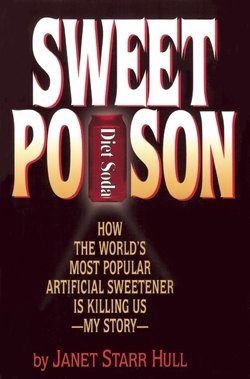Читать книгу Sweet Poison - Janet Starr Hull - Страница 9
На сайте Литреса книга снята с продажи.
ОглавлениеFOREWORD
We can trust our government to protect us from all enemies, foreign and domestic. Right? Well, guess again. You can trust your doctor to make an accurate diagnosis and then prescribe an appropriate remedy. Right? Well, almost. If your child or your spouse seems out of sorts, not up to par, has aches and pains, complains about fatigue, and a few other vague symptoms, he/she must be anemic, be under stress, or has parasites. Maybe so, maybe not.
When I started practice, armed with the latest knowledge of drugs and how to use them, I did what I had learned in medical school. Pain? I treated with pain killers. Sick? A prescription for an antibiotic. Hyperactivity? Rx for Ritalin or an amphetamine. Allergy? A shot of cortisone. We had it all. And people knew that we had the answers and the prescription pad.
A few smart-aleck parents, however, wanted to know why the kid got sick in the first place. Answer: “Maybe he has bad genes from the father’s side of the family.” As time went on I began to realize that there were reasons for symptoms. These children did not have a Ritalin deficiency or a lack of penicillin. They were being poisoned by air, water and food, and their immune systems were failing. My wake-up call came when I realized that almost all hyper children (now labeled ADD) were low in magnesium, essential fatty acids and some B vitamins. They were often needlessly treated with antibiotics for virus infections. That changed their gut flora. We had to start all over.
Just a brief review of standard medical literature indicated that our topsoil was disappearing and with the processing of food, nothing was left in our store-bought food but sugar, starch, flavors and trans-fats (the bad kind). Store-bought food leads to store-bought diseases. When I made sure that children got whole foods plus some vital minerals, vitamins, and essential fatty acids, many of their symptoms disappeared. They were not depressed. They were less sick. They would concentrate in school. I began to ask the right questions.
“Is your child a Jekyll and Hyde type?” Alternating between good and bad behavior is a give-away clue for hypoglycemia due to sugar ingestion or food sensitivities.
“Did your child have ear infections as an infant?” Ear infections mean cow milk has produced mucus in the ear tubes.
“Is your child restless and hyper-alert?” When the teacher complains about the child’s inability to sit still in the classroom, it usually means that he is low in magnesium.
And so it goes. I was realizing that for almost every symptom that the parents complained to me about their child, there was a nutritional component involved. Ben Feingold discovered that many unruly children had reactions when they ate foods containing salicylate. MSG was a problem to many. We began to question everything that was not organic, or pesticide-free.
When aspartame came on the market, the incidence of reactions to food shot up. People were passing out, becoming depressed, having seizures, and developing symptoms of thyroid imbalance (Read about Jan in this book). Deaths have even been reported. When the FDA is asked about these reactions, they have two clever answers: (1) Research indicates that it is safe, and (2) Aspartame is considered food, so the FDA does not have to take note of these reactions.
The mixture of these potentially toxic substances in aspartame is about 160 times as sweet as plain sugar. What a concept. People who need their food and coffee to taste sweet would not get the unwanted calories. But look at what happens in the body. When this sweet taste hits the tongue, the message goes to the hypothalamus in the lower brain and states, “Incoming sugar!” This nerve center sends a message to the pancreas to squirt out some insulin in preparation for the sugary calories. But no sugar arrives. The insulin lowers the blood sugar, and, in some people, it could drop to a point where the brain cannot function. Pilots pass out at the controls in the cockpit. Some folks will have seizures. An occasional child will become hyperactive. Some people will get pounding headaches. Many are depressed when they swallow this stuff. Mary Stoddard, founder of Aspartame Consumer Safety Network, got eosinophilia myalgia. Janet got a diagnosable illness: Graves’ disease.
How many doctors ask the question, “What are you eating and drinking?” Even if the patient asks if it could be aspartame, the doctor reassures the patient with, “Nah. You’re depressed. Let’s try some Prozac.” If treating a wild and hyper child, the doctor might say, “He needs Ritalin.”
Janet Hull has been through all these hassles. You will not have to do the same. Even if you do not have any reportable symptoms, you will be amazed at how much better you feel and sleep after two weeks of being off the stuff. That may be the hardest trick: to eat without inadvertently getting some of it in your diet.
Janet has put up one more flag to tell us that we must be as organic as possible.
Dr. Lendon H. Smith
June 1998
